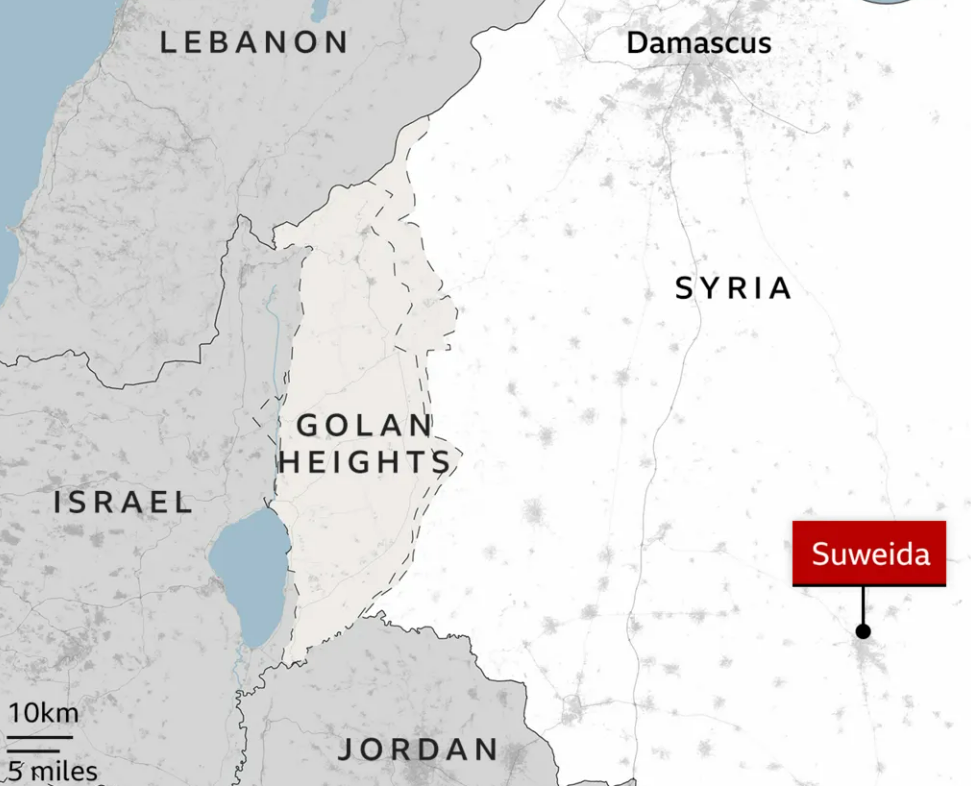Who Are the Druze?
The Druze are a small but influential Arabic-speaking ethno-religious minority primarily found in Syria, Lebanon, Israel, and the Israeli-occupied Golan Heights. Their religion is an offshoot of Ismaili Shia Islam but incorporates elements from various philosophies and belief systems, including Gnosticism, Neoplatonism, and Hindu influences. The Druze faith is highly secretive, and religious texts are accessible only to a select group within the community known as the uqqal (the wise). Socially and politically, the Druze have long maintained a cautious approach to surrounding powers, often prioritizing self-preservation through neutrality or local autonomy.

In Syria, the Druze make up about 3% of the population—roughly 500,000 people—most of whom are concentrated in the southern province of Suweida. During Syria’s long civil war, the Druze in Suweida formed their own militias to defend their communities and refused full integration into the national military forces. Even after the fall of Bashar al-Assad in December 2024, the Druze community has remained skeptical of the new Islamist-led government under Ahmed al-Sharaa. Although some Druze factions are open to dialogue with Damascus, others strongly reject state authority, especially in light of recent military actions in Druze areas.
Why Is Israel Bombing Syria Now?
Israel’s latest military intervention in Syria is a response to escalating sectarian violence in Suweida and a strategic effort to counter perceived threats near its northern border. On 13 July, a Druze merchant was reportedly abducted by Sunni Bedouin fighters, triggering intense fighting between the two groups. Over the following days, violence spiraled, and Israeli officials claimed that pro-government Syrian forces were complicit in attacks on the Druze community. In response, Israeli forces carried out air strikes on 15 July, initially targeting security units in Suweida, and then expanded the campaign the next day to include military sites in Damascus, such as the Ministry of Defence and Syrian army headquarters.
Israel says its actions aim to protect the Druze and prevent Syrian government forces—and by extension, allied Islamist militias—from establishing a stronghold near the Israeli-occupied Golan Heights. Tel Aviv views the presence of Sharaa’s Islamist-aligned forces in southern Syria as a direct threat to national security. Furthermore, Israeli leaders have stated that they are working to build alliances with Syria’s marginalized minorities, including the Druze, Kurds, and Alawites, to prevent the consolidation of hostile forces in the post-Assad landscape.
What Sparked the Latest Crisis in Suweida?
The violence in Suweida began after a Druze civilian was allegedly kidnapped, an act that ignited deep-seated sectarian tensions. What followed were several days of armed clashes between Druze militias and Sunni Bedouin fighters, resulting in heavy casualties. By 16 July, the death toll had surpassed 350, according to the Syrian Observatory for Human Rights. While the government in Damascus condemned the violence, its forces have also been accused of committing extrajudicial killings against Druze civilians and fighters. These conflicting actions have increased mistrust between the Druze and Syria’s new rulers.
This marks the second major outbreak of violence in Suweida in recent months. In April and May 2025, Druze militias had already engaged in armed confrontations with the central government’s security forces, resisting efforts to reassert control over the province. Many Druze perceive these operations not as peacekeeping efforts but as attempts to suppress their autonomy.
How Has the World Responded?
International reaction to the crisis has been swift and divided. The United States, through Secretary of State Marco Rubio, expressed deep concern over the rising death toll and announced an agreement to take urgent steps to de-escalate the situation. Several Arab nations—Lebanon, Jordan, Iraq, Qatar, and Egypt—have publicly condemned Israel’s military strikes, accusing the country of violating Syria’s sovereignty. Saudi Arabia denounced the air raids as “blatant aggression,” and Iran labeled them “predictable provocations.” Turkey criticized the Israeli strikes as deliberate sabotage of Syria’s attempts to restore internal stability.
The United Nations has also weighed in, with Secretary-General António Guterres urging restraint and condemning what he termed Israel’s “escalatory” actions in Suweida and Damascus.
What Happens Next?
The latest round of violence underlines the fragility of Syria’s post-Assad transition. President Ahmed al-Sharaa, a former jihadist leader, faces an uphill battle to stabilize the country and unify its fractured society. Deep-rooted sectarian divisions, combined with military interventions from foreign powers like Israel, threaten to reignite broader conflict. Sharaa’s promise to protect minority groups is being tested as clashes increase, especially in minority-populated areas like Suweida.
Israel, on the other hand, is expected to maintain its aggressive posture. With a long-standing policy of preemptively striking perceived threats near its borders, Israel is likely to continue operations if it believes that Islamist groups or hostile state forces are gaining ground near the Golan Heights. The potential for further escalation remains high, especially if the Druze crisis expands or if Syria’s new government fails to manage its internal divisions.








